New Dolphins Boss Woodhouse Calls For Greater Transparency As Risk Grows Of Paris Protests Over China’s Go-Free-23

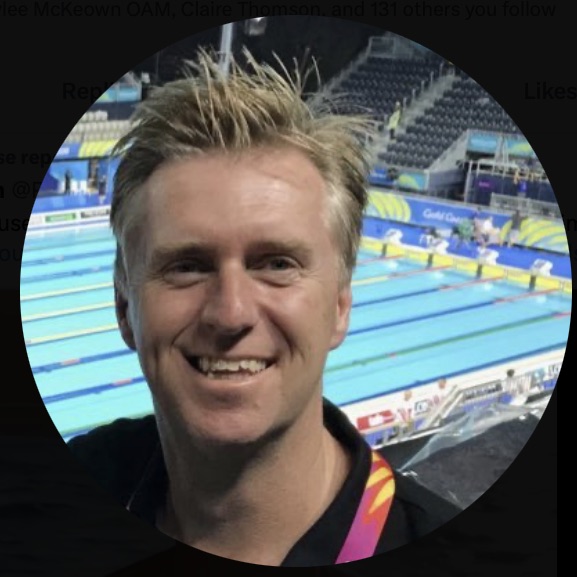
New Dolphins boss Rob Woodhouse has suggested that greater transparency from global anti-doping bosses in the wake of the go-free-23 Chinese positives could help prevent protests at the Paris Olympic Games over the doping controversy that’s sparked a war of words between clean-sport gatekeepers.
in his first interview in the top job in Aussie swimming, Woodhouse, agent to British Olympic champions Adam Peaty and Duncan Scott until his recent appointment as CEO back home, was called for the World Anti-Doping Agency (WADA) to embrace greater transparency ahead of Paris if the anger of “fed-up” athletes is not to taint the showcase event.
“It’s fair to say there is definitely disappointment and some anger from athletes, not just here in Australia but around the world,” said Woodhouse, a 1984 Olympic medallist in the pool for Australia, with a nod to the 23 Chinese swimmers who tested positive for banned heart booster trimetazidine (TMZ) in early 2021.
All got the all-clear from Wada in a confidential report a month before the Tokyo Olympic Games on grounds that Chinese state security informed Chinada that TMZ had been found in the Huayang Holiday Hotel kitchen almost three months after the swimmers had left the place they stayed during a competition in the northern city of Shiajiazhuang.
The conclusion was “mass contamination”, though there were no answers to how the drug shot in a spice container and spread to the food and then plates of Chinese swimmers and interviews with staff at the hotel came up with not a single possible source of the heart booster.
At a time when the International Olympic Committee (IOC) is anxious about the threat of protests in Paris, over the conflicts in Ukraine and Gaza, Woodhouse told News Corp and Fairfax reporters that he won’t be telling athletes to be silent over their concerns that doping rules are not being evenly applied.
Woodhouse: Protests In Their Place
“Personally, I would like to think that protests stay away from the Olympic podium and places like that [but] I have no issue with athletes having a voice. I won’t be saying anything to the swimmers in that regard,” said Woodhouse.
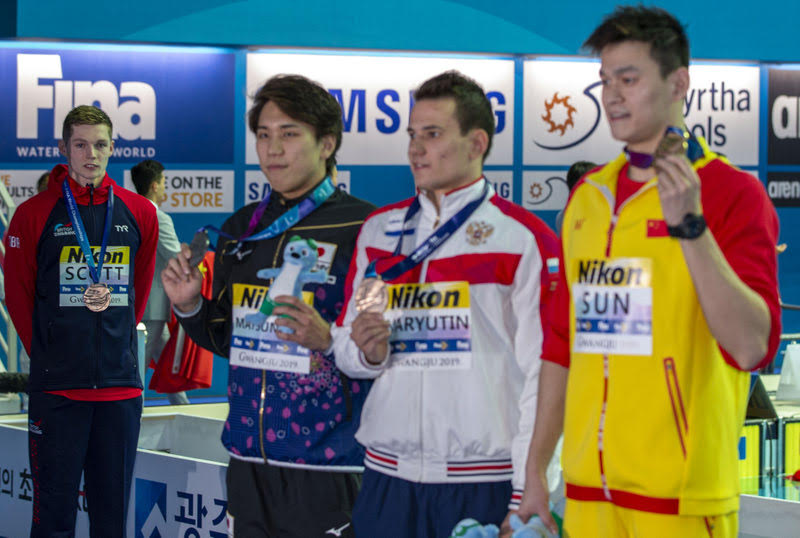
Woodhouse has long backed the right of athletes to exercise their right to freedom of expression. He was there to witness Scott’s peaceful protest at the 2019 World Championships in Gwangju, Korea, when the swimmer refused to pose for podium photos with Chinese controversy Sun Yang*.
Sun was racing despite a pending hearing at the Court of Arbitration for Sport (CAS) into a row with anti-doping testers in September 2018 that ended in the casing of a vial containing the swimmer’s blood sample being smashed with a hammer on the pavement outside the control room after Sun had removed it from the chain of custody.
The matter was kept secret until The Times exposed the truth in January 2019 and Wada launched an appeal against a decision by world swimming regulator Fina to let Sun off with a warning. The appeal led to Sun being handed a four years and three months suspension, which ended this week.
Sun has told Chinese media that he still hopes to be added to the swimming squad for Paris, if only for the 4x200m freestyle relay in which Scott and his Great Britain mates will defend the crown. Adding Sun to a Chinese team that already has 13 questions on its roster, centred on how TMZ got into their bodies, would be almost certain to spark a further round of protest over China via a man with two WADA-Coide violations too his name.
Sun’s ban was not his first. Four years earlier he had tested positive for TMZ. He was given a retrospective and lenient three-month suspension but the timing of events meant that Sun never actually served the time-out penalty.
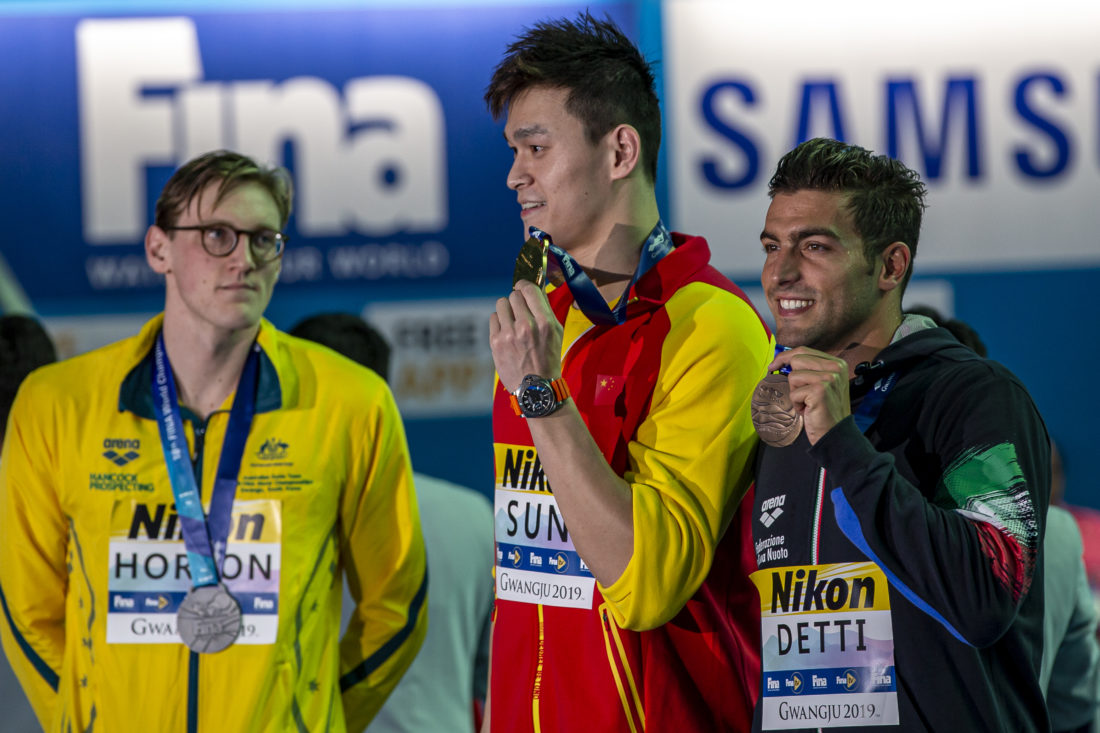
Scott’s refusal to stand with Sun for snaps with fellow medallists in the 200m freestyle in 2019 followed a similar incident involving Australia Mack Horton in the 400m freestyle. Sun, who was booed to his blocks at the Rio 2016 Olympic Games over the handling of his 2014 positive test, shouted in Scott’s face “me winner, you loser!” under a giant Fina Championships logo reading “Dive Into Peace“. All three were slapped with warnings for “bringing the sport into disrepute” by FINA, such action a stark contract to the lack of action on matters far and away more serious, some of them of the time, others dating back decades.
Now, Woodhouse says that while he understands “the athletes’ views” and upholds their right to freedom of expression, he also appreciates that “the Olympics is all about unity and bringing the world together, bringing countries together.”
He added: “Protests, as we know, can lead to discrimination and other issues that can incite violence so it’s something that anyone needs to be very careful about. The IOC has obviously their own rules in regards to that, but the athletes may or may not adhere to those rules.”
The risk of protest in Paris was obvious if Wada fails to reassure athletes with a pledge of greater transparency in the anti-doping system. In light of the latest Chinese scandal, he said it would be naive to think there were not many more cases that have gone unreported.
“That’s why we need to push for that transparency. Not just now because of what’s happening with China and the Chinada (China Anti-Doping Agency) situation, but that transparency has got to be ongoing. Athletes have a right to have this sort of information and know about it. It’s a really important part of the fight against drugs in sport.”
News of an alleged mass contamination event during a competition in northern China in the first week of 2021 was revealed two weeks ago in a news story by News Corp’s Julian Linden, the investigation by German broadcaster ARD and the New York Times that sparked it following hot on the heels of the Australian headline.
As a war of words ensued between Wada and affiliate anti-doping authorities, American agency Usada at the forefront of calls for a review and overhaul ate the global body, 13 of the 23 swimmers who returned positive tests more than three years ago qualified for the Paris Olympics at the Chinese Swimming Championships.
Under pressure from sports organisations worldwide, Wada has called an investigation but the independence of the man who will lead it, retired Swiss prosecutor Eric Cottier, has been called into question. Usada described his was a “cherrypicked attorney from [Wada’s] own back yard”, because Cottier served at the helm of the judiciary in Vaud for many years.
The Swiss region, home to the IOPC, World and European Aquatics along with many other Olympic sports organisations, donates to the annual Wada symposium and had close ties with officials involved in the decision to let the 23 positive cases off the hook in 2021.
Wada has sound arguments on its side for circumstances when athletes are due confidentiality shy of a case being opening in the event of a doping positive where no fault can be established. However, whether “no fault” applies in this case, whether “no fault” rules need revisiting and revising and whether there has been sufficient due diligence for everyone to assume that China is being held to the same level of scrutiny and accountability on anti-doping as every other country are at the centre of a debate that is not going away any time soon.
Woodhouse is among those who has called for review and reform of some of the most pressing concerns involving Wada structures and governance.
Indeed, some oil those arguments have been around for quite some time, this from Global Athlete in its 2020 Year-End Letter:
WADA Reforms: For over three years, athletes and athlete groups have been demanding significant reforms at the World Anti-Doping Agency (WADA). Recently, 14 National Anti-Doping Organizations (NADOs) and 14 Athlete groups came together to collectively call for more athlete and NADO representation and engagement in WADA governance, while also highlighting the critical need for the agency to move toward greater independence, transparency, and accountability. These calls for reform are supported by the U.S. Office of National Drug Control Policy (ONDCP), the largest governmental funder of WADA. In support of athletes, the ONDCP has threatened to withdraw WADA funding should meaningful reforms not be implemented.
Athletes will continue to push for more meaningful reform at WADA.
Woodhouse: “Without Transparency, Athletes are just Going To get Fed Up With It.”
The mood of athletes in Paris is “bound to be affected by the timing and outcome” of the Cottier-led investigation, which is due to report a month before the Paris Games in mid-June, a senior anti-doping source tells SOS.
“There’s the risk of a perfect storm brewing,” the source added. “The Chinese affair comes on the back of big events in global politics sparked by the conflicts in Ukraine and Gaza. The IOC and Paris organisers would be right to feel concerned but telling athletes not to express their views could add fuel to the flames.”
In his last interview before heading into final preparation camps ahead off Paris 2024, Peaty also called for greater transparency from Wada.
He said: “As an athlete you want to be treated fairly and [have] full transparency and make sure that in those cases those results [positive test] are not hidden and they’re not put under secrecy. A lot of swimmers are very disappointed in Wada.”
With a nod to the China crisis and the battle ahead, a third “attack” on the 100m breaststroke after victories at Rio 2016 and Tokyo 2020ne that made him the first British swimmer to retain a title in the Olympic pool, Peaty, whose closest rival ion the clock, World champion Qin Haiyang, is one of the 23 positives, said:
“This is probably the hardest time to win one, with so many distractions going on, which we all are aware. So if I’ve ever got a reason to do one, it would be this one, but I’ve got to keep my emotions in check on that one and make sure we’re ticking off the process every day and using the emotion when we need it.”
There’s much talk in the realm of domestic federations of the “distraction” for athletes when it comes to being drawn into commenting on a situation that impacts them. In contrast, Woodhouse isn’t worried about Australian swimmers being distracted ahead of Olympic trials next month:
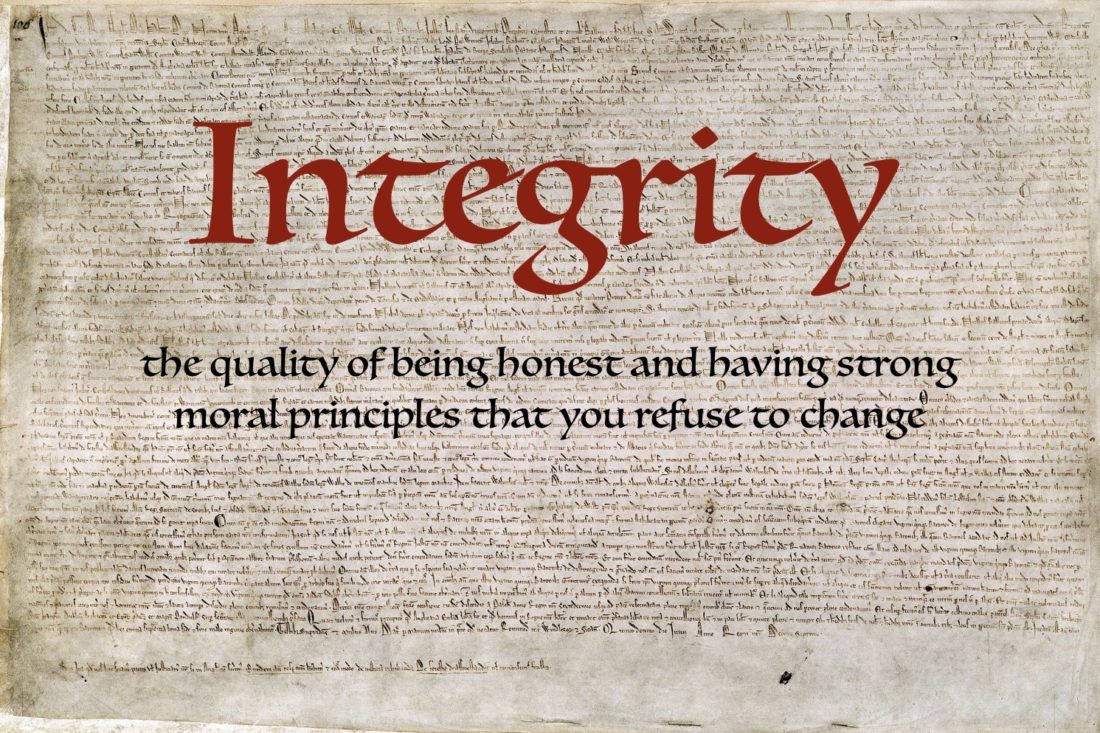
“All the athletes obviously have a pretty heavy focus on what’s going to happen next month so they want to be concentrating on that, they don’t want this issue to be dominating their thoughts or their preparation… Probably the bigger longer term push for us, which we are continuing to push, is that call for greater transparency in these sorts of cases, because without that, if issues like this pop up from time to time, naturally athletes are just going to get fed up with it.”
Rob Woodhouse – image: transparency is intrinsically linked to integrity in sport
Key Statements In The New China Crisis
Global Athlete and FairSport: Joint Statement from Global Athlete and FairSport
Usada:
Response to WADA’s Self-Serving Appointment of an “Independent” Prosecutor
Call for Independent Prosecutor and Overhaul of WADA
Wada
WADA invites independent prosecutor to review its handling of the go-free-23 case
WADA statement regarding ARD documentary concerning Chinese swimming
WADA statement following comments by CEO of United States Anti-Doping Agency
WADA statement on case of 23 swimmers from China
Chinada
Statement following WADA’s Launch of Compliance Audit on CHINADA
Ukraine Tells Its Athlete: Steer Clear Of Russians & Belarusians in Paris
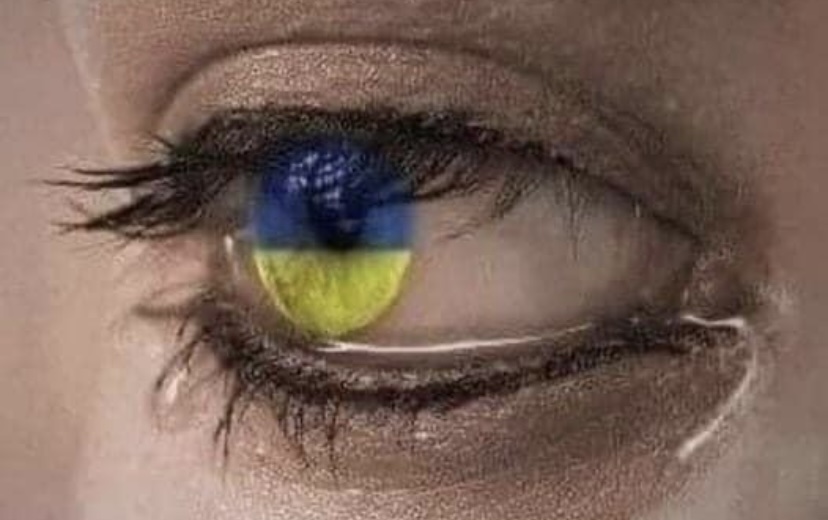
On Thursday this week, Ukrainian athletes were urged by their country’s National Olympic Committee (NOC) to avoid contact with Russians and Belarusians at the Games in Paris, with a view to avoiding possible “provocative actions”.
The recommendations include refraining from “direct contact with representatives of the aggressor countries, which could lead to provocative actions on their part in the Olympic Village or outside it,” said Ukraine’s NOC and the Ministry of Youth and Sports.
Ukrainian athletes are also asked “not to communicate or discuss on social media with individual neutral athletes from Russia and Belarus” and not to share or respond to their content.
The advice stretched to keeping “as much distance as possible” from Russians and Belarusians and refraining from taking photos with them, “unless such a need is related to compliance with the mandatory requirements of the competition rules,” including medal ceremonies.
Ukrainian athletes were also urged to refrain from “participating in press conferences, live broadcasts, interviews and other promotional events with individual neutral athletes of the Russian Federation and Belarus before and after the competition.”
The New China Crisis & WADA’s Decision To Launch An Investigation 2020-2024
ARD’s “Doping Top Secret – The China Files” – Parts 1-4 – Watch Why WADA U-Turn Is Urgent
SOS Analysis
The ARD China Files: Part 1 – SOS Analysis: Spies, Spice & Mass Contamination
The ARD China Files: Part 2 – SOS Analysis: On The Trail Of An Existential Precedent?
The ARD China Files: Part 3 – SOS Analysis: Lab Trials For TMZ & Testing Timeframes
SOS Related Coverage
Sport Integrity Australia Backs USADA Call For WADA Review Of China’s Go-Free 23 Positives
Chinada Says It Has Worked With “Zero-Tolerance” Attitude Towards Doping
USADA Calls For Independent Prosecutor & Overhaul of WADA In New China Crisis
WADA In Staunch Defence Of Decision Not To Challenge 28 Positives In 23 Chinese Swimmers
Sunday Essay: Caution: Olympic Hotel Contamination May Contain Trimetazidine? We’d Be Nuts To Think So
New China Crisis As ARD Reveals That 23 Swimmers, Zhang, Wang & Qin On The List, Tested Positive For Sun’s 1st-Offence Drug